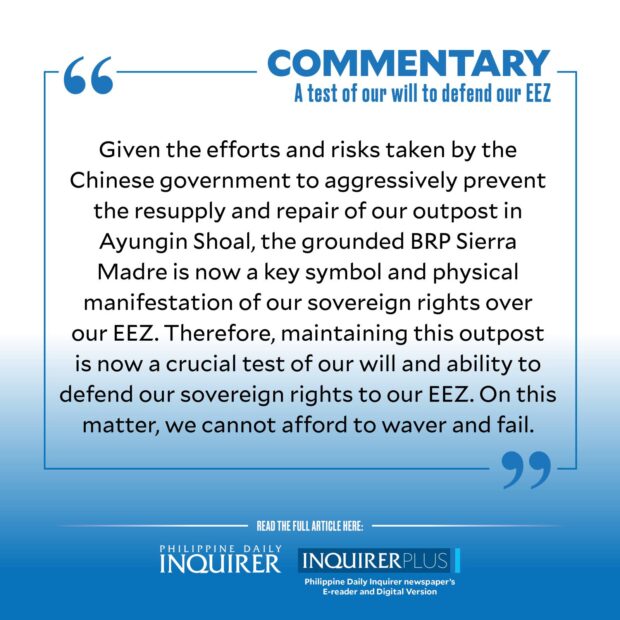A test of our will to defend our EEZ
 The Aug. 5 incident that had the China Coast Guard (CCG) firing water cannons at the Philippine Coast Guard (PCG) and the resupply ships it was escorting, is just the latest act of harassment and gray zone activity by the Chinese government against the Philippines in the West Philippine Sea.
The Aug. 5 incident that had the China Coast Guard (CCG) firing water cannons at the Philippine Coast Guard (PCG) and the resupply ships it was escorting, is just the latest act of harassment and gray zone activity by the Chinese government against the Philippines in the West Philippine Sea.
China’s gray zone tactics in waters in which the Philippines has sovereign rights under the United Nations Convention on the Law of the Sea (Unclos) take many forms, and are conducted in areas to which China claims sovereignty based on so-called preexisting historical rights and the nine-dash line. These actions range from harassing Filipino fishermen and swarming maritime features with hundreds of China’s fishing and maritime militia vessels, to more aggressive acts such as dangerous maneuvers risking collision, and the use of military-grade lasers and water cannons.
These gray zone tactics aim to normalize Chinese control of disputed maritime areas and wear down our will and ability to exert sovereign rights over our exclusive economic zone (EEZ). In 2023 alone, the CCG’s aggressive and dangerous actions included the use of military lasers on Feb. 6, a near collision with BRP Malapascua on April 23 due to dangerous maneuvers by the Chinese vessel, another near collision with BRP Malabrigo on June 30, and the latest, the Aug. 5 water cannon incident.These latest incidents have been the most serious challenges faced by the PCG and have raised tensions in the area. What is interesting to note is that the CCG conducted these four acts in one area, in the vicinity of Ayungin Shoal, with one specific goal: to stop the resupply missions to the Philippine outpost on the BRP Sierra Madre, a World War II-era Philippine Navy vessel that was intentionally grounded on the shoal in 1999 to serve as an outpost in our EEZ. The efforts to prevent the resupply of our outpost in Ayungin Shoal is aimed at isolating the troops stationed there, in the hope that it would compel us to abandon the vessel and cause it to decay and sink into the sea.
Following the water cannon incident, it didn’t take long for the Chinese government to confirm its intentions regarding the Ayungin outpost when its foreign ministry released a statement on Aug. 7, claiming that the Philippines had promised several times that it would tow away the grounded BRP Sierra Madre and “has yet to act on it.” The Philippine government immediately refuted Chinese claims of such a promise being made.
In a statement released on Aug. 8, National Security Council Assistant Director General Jonathan Malaya stated that “The Philippines has not and will never enter into any agreement abandoning its sovereign rights and jurisdiction over Ayungin Shoal.” The shoal is 104 nautical miles off the coast of Palawan and is well within our country’s 200-mile EEZ.
Aside from entitlements under Unclos, Philippine sovereign rights to our EEZ is bolstered by the 2016 arbitral ruling by the Permanent Court of Arbitration in The Hague, which ruled that China’s claim to historic rights and the nine-dash line were superseded by the maritime regime created by Unclos. This incompatibility with Unclos means these so-called preexisting historical rights asserted by China no longer exist. This 2016 arbitral ruling also renders moot any agreement—should there be any—about towing away the grounded BRP Sierra Madre.
It’s also kind of cheeky if not downright hypocritical of China to talk about promises when what they had promised would merely be shelters for their fishermen during typhoons eventually became militarized artificial islands.
Given the efforts and risks taken by the Chinese government to aggressively prevent the resupply and repair of our outpost in Ayungin Shoal, the grounded BRP Sierra Madre is now a key symbol and physical manifestation of our sovereign rights over our EEZ. Therefore, maintaining this outpost is now a crucial test of our will and ability to defend our sovereign rights to our EEZ. On this matter, we cannot afford to waver and fail.
Moira G. Gallaga served three Philippine presidents as presidential protocol officer, and was posted as a diplomat at the Philippine consulate general in Los Angeles, and the Philippine Embassy in Washington.




















